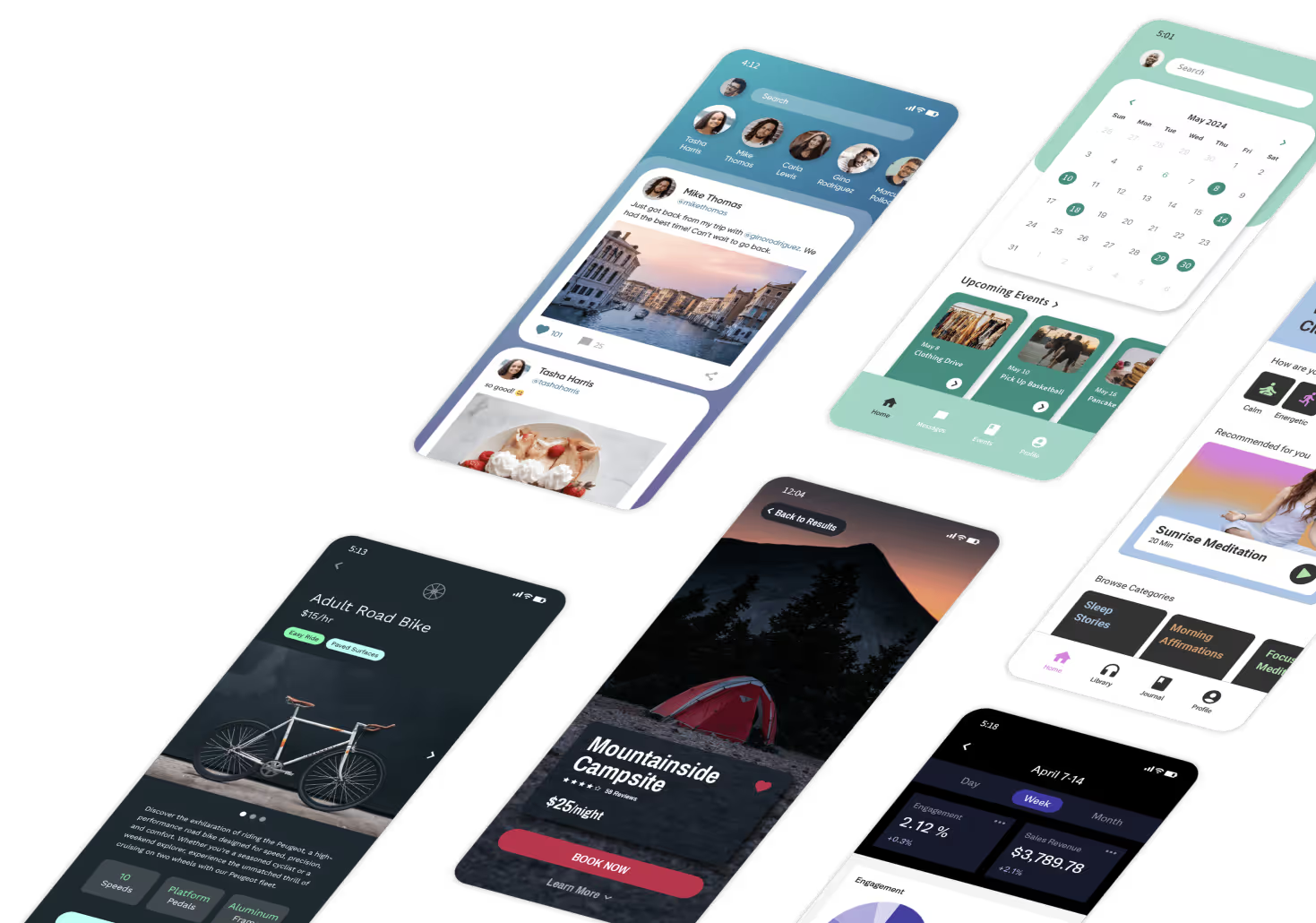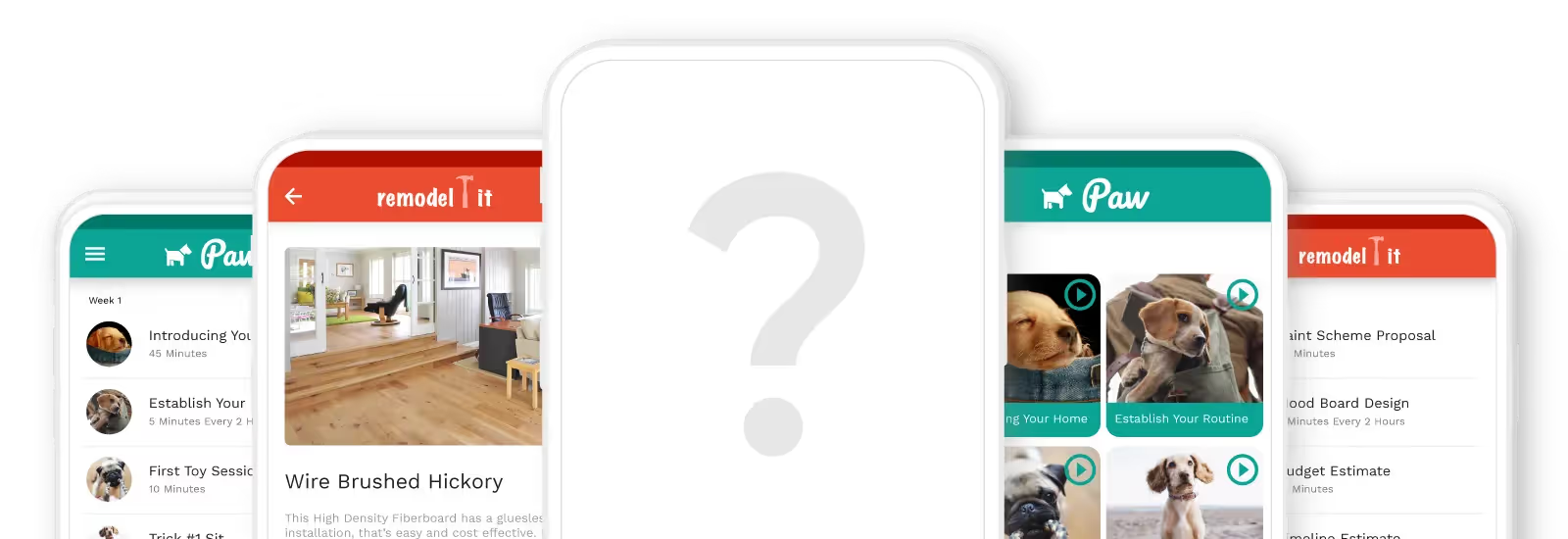
Ready to jump into mobile app development without a degree in computer science? Meet Adalo, Appsmith, and Glide — the top low-code and no-code platforms making waves in 2025.
Ideal for freelancers and medium organizations, they offer unique templates, integrations, and pricing plans.
Read on to learn more about:
- How we selected each platform
- 8 top low-code and no-code mobile app development platforms
- Selecting the right platform for your needs
Note: We also added some no-code tools that have power and customization yet are more user-friendly than some low-code app builders.
Top 8 Low-Code and No-Code App Development Platforms
- Adalo: Best overall
- Appsmith: Great for medium-sized organizations and up
- Glide: Great for breathtaking aesthetics
- FlutterFlow: Good for freelancers
- Bubble: Good for a flexible no-code option
- Backendless: Good for a highly customized backend
- Softr: Good for no-code internal business apps
- Bravo Studio: Good for designers aiming to make innovative apps
How I Chose My Top 8 Platforms
Since 2014, I’ve worked with no-code and low-code app builders and tools. I even started a website, NoCode.tech, which, despite the name, is dedicated to reviewing and recommending low-code and no-code mobile app development platforms. So, you can say I’m a bit of a low-code/no-code expert.
For this article, I tested several platforms, jotting down standout features and noting areas where some fell short. After crossing out a few platforms that didn’t make the cut, I narrowed down a list of 8 tools.
Each of the app builder on my list lets you do the following:
- Scalability: The 8 platforms on my list let you create an app that reaches your intended audience size. This means your users can find your app on the web, the Apple App Store, and Google Play Store. You’ll be able to accommodate an audience of 1,000s or more if need be.
- Flexibility: Need an app builder for crafting solutions for all aspects of your business processes and operations, such as your sales, accounting, and project management tasks? Or perhaps you need an app to manage your team of personal trainers and their clients.
No matter what kind of app you need for your business, the platforms I’ve selected should provide you with enough flexibility to execute tasks with speed and productivity.
- Learnability through ecosystems: Once you’ve selected an app builder, you’ll want to learn to leverage every feature and functionality. After all, you’ll most likely be using your chosen platform for the long run.
Each of these 8 app builders provides an abundance of learning resources, like tutorials, YouTube videos, courses, and a forum for asking questions and connecting with fellow app builders. With a bit of time spent consuming these resources, you’ll be able to master your platform of choice.
#1 Adalo: Best Overall

Overview
Adalo is a no-code native mobile app builder that strikes an ideal balance between simplicity, flexibility, and customization.
Features
- With nearly 40 templates to choose from, there’s really no limit to the kind of app you can build with Adalo. Start with a template for a social media app, booking app, or KPI dashboard, and craft it into a final product that perfectly reflects your tastes and business needs.
- Need to transfer data from a third-party account to your app or connect with a tool? With 1,000s of integrations, Adalo makes it possible to transfer data from Zapier, take payments with Stripe, or leverage Google Maps for GPS features.
- If you already have a pre-built backend from Airtable or Xano, you can connect it to your Adalo app with just a few clicks. And, if you sign up for Adalo’s Team or Business Version, Adalo will throw in Xano’s Launch Plan (a $99/month value) for free.
- While Adalo is genuinely one of the easiest app builders out there, its rich ecosystem is nothing to scoff at. Learn everything you need to about improving your app with the Adalo App Academy, improve your skills with help documents, and connect with Adalo vets and fellow app builders on Adalo’s forum.
Ideal Users
Adalo perfectly fits the needs of freelancers, entrepreneurs, and small and medium businesses. It's an easy enough platform to use right after signing up, so you’ll be able to spend time building your app, not scratching your head.
Pricing
Start using Adalo for only $45/month (billed monthly).
The Bottom Line
If you’re looking for a low-code mobile app development alternative to create a powerful app that you can publish to the web, Apple App Store, or Google Play Store, go with Adalo.
#2 Appsmith: Great for Medium Organizations and Up

Overview
Appsmith is a low-code, open-source web app builder that’s made exclusively for building internal business apps and tools, like automations, project management boards, and others.
Features
- Not only does Appsmith come with integrations to popular AI tools like OpenAI (the makers of ChatGPT) and Claude for creating chatbots and other AI features, but you’ll also get Appsmith’s own AI tool, which can help guide you through app-building, generate custom code, and much more.
- Appsmith is open source, meaning you can keep your app’s source code. Share it on GitHub and discover ways to improve your app or further develop it with your own programming abilities.
Ideal Users
Because it’s a low-code tool, you’ll need to bring some technical expertise, such as knowing how programming and databases work and are structured. While Appsmith does offer a great free version, the paid tiers are geared for medium-sized organizations up to enterprises.
Pricing
For $40/month (billed monthly), create as many apps as you wish, but with a 100-hour use limit — if you and your team exceed 100 hours, you’ll need to pay $0.40 per hour. Need more use? Try the enterprise version, starting at $2,500/month (billed monthly), giving you up to 100 users and advanced security measures with integrations to Auth0, Okta, and more.
The Bottom Line
Appsmith is a solid, go-to low-code development platform for mid-sized and above companies that aim to create endless internal apps to bolster operations.
#3 Glide: Great for Truly Breathtaking Aesthetics

Overview
Glide is a no-code web app builder that allows you to create your app’s fronted, backend, and database all from the same platform.
Features
- When you build with Glide, you’re almost guaranteed a gorgeous-looking app. All of Glide’s templates, widgets, and features are stunning, allowing you to craft an eye-grabbing final product.
- Glide also boasts over 35 third-party integrations that can add brawn to your beautiful app. For instance, send push notifications to users who’ve downloaded your app’s progressive web app version to their phones or use the Segment integration to track your app’s user behaviors so you can configure your settings to meet their needs.
Ideal Users
Glide is an excellent platform for businesses of nearly any size to create both internal business apps and external client-facing apps for anonymous users. However, the platform doesn’t provide app store publishing, so users must download your app to their devices via a link or find it on the web using their browsers.
Pricing
Glide starts at $86/month (billed monthly), allowing you to build up to 3 apps and providing access to all of Glide’s 35+ integrations. The $249/month (billed monthly) lets you create unlimited apps with 100,000 data rows.
The Bottom Line
If you need a modern app with cutting-edge AI features and powerful integrations, choose Glide.
#4 FlutterFlow: Good for Freelancers and Agencies

Overview
FlutterFlow is a low-code mobile app development platform for creating web apps and apps for the Apple App Store and Google Play Store.
Features
- You’ll get loads of low-code features, like the ability to keep your source code and a GitHub integration to share your app with other developers easily.
- FlutterFlow is one of the most flexible low-code app builders on the market. It provides the functionalities to nearly any app you can imagine — an internal business tool for your processes or an external, client-facing app for restaurant booking.
Ideal Users
Because FlutterFlow is low-code, you’ll need to bring some technical expertise. The platform supports creating nearly any type of app, and it also has a team-pricing plan that appeals to agencies, as your team will be able to build apps together in real time.
Pricing
FlutterFlow pricing starts at $30/month (billed monthly), allowing you to download your code and giving you access to its enormous template library. For $70/month per seat, you can get FlutterFlow’s team version, which allows for access control and real-time collaboration.
The Bottom Line
With plans for agencies and enough customization for nearly any app type, FlutterFlow is a cost-effective, low-code mobile app builder.
#5 Bubble: A Flexible No-Code Option

Overview
Bubble is one of the most flexible and battle-tested no-code web app builders available—it’s been in existence since 2012.
Features
- While you don’t need to know any tech or coding skills to use it, Bubble is one of the toughest no-code app builders, with a very complex building interface. Luckily, Bubble boasts an enormous ecosystem, which has been growing for over 12 years, and is packed with tools and resources to ensure you’ll learn everything you need.
- Bubble also features one of the largest template libraries, offering over 1,000 free and paid templates. The library includes categories for booking, finance, online marketplaces, and more.
Ideal Users
Bubble is a wonderful platform for freelancers looking to develop apps they can sell or large Fortune 500 that need never-ending solutions — it’s truly one of the most flexible app builders. You’ll just need to put in a few months of elbow grease to master the building interface.
Pricing
For only $32/month (billed monthly), you can create an app with unlimited database size and up to 2 days of database backup history to reiterate the function you plugged in yesterday. The $134/month (billed monthly) version lets you build a significantly large app of up to 100GB while allowing for another editor.
The Bottom Line
If you need a flexible, no-code app builder for a complex project and are willing to spend time learning the interface, Bubble might be for you.
#6 Backendless: Good for a Highly Customized Backend

Overview
Backendless is one of the most flexible low-code app development tools, allowing you to build nearly any app you can imagine.
Features
- While Backendless is a low-code platform and requires technical knowledge, it features a surprisingly simple building interface for your frontend, which leverages drag-and-drop functionality. Use this to build out your frontend in a jiff.
- Backendless’s backend builder is a bit more complex. Still, it lets you customize your backend logic to a “T.” It allows for such pinpoint control by leveraging Codeless, Backendless’s very own coding language, which is simple to learn if you have experience with programming.
Ideal Users
Whether you’re a startup looking to make apps to organize your business processes or you’re a multinational company, Backendless has a plan for your needs. You’ll just need to ensure that you or your team knows your way around tech.
Pricing
Backendless offers cloud pricing starting at $15/month (billed monthly). This includes 10 API keys and 1 million database objects, but you can also purchase individual features, like 10GB of extra storage space, for $20/month.
Pricing for bigger companies starts at $7,200/year. These plans let you run your Backendless app on-prem (your own on-site servers), giving you scalability, better security, and other functions.
The Bottom Line
If you’re very particular about how your backend logic functions or you just need a few features at a cost-effective price, check out Backendless for your low-code app development solution.
#7 Softr: Good for No-Code Internal Business Apps

Overview
Softr is a no-code frontend builder for creating business apps.
Features
- To use Softr, you’ll need to bring an external database before you get started. Fortunately, Softr integrates with several database providers, like SQL, Airtable, HubSpot, SmartSuite, and a few others.
- Softr provides a simple front-end builder. It features dynamic pieces that link your data to your front end, such as charts, timelines, Kanban boards, and more. This makes it easy to display your data so users can easily interact with it.
Ideal Users
Softr is purely designed to build internal business tools from databases. However, Softr has a pricing plan for businesses of any size.
Pricing
Start using Softr for only $59/month (billed monthly), and you'll get payment integrations, Kanban graphics, and even the permission to embed your own code for custom frontend commands.
The $167/month (billed monthly) version offers extra visual features, such as organizational charts, and allows for white-label branding.
The Bottom Line
For businesses that need to build apps from data quickly, Softr is a great no-code option that requires no technical expertise.
#8 Bravo Studio: Good for Designers Aiming to Make Innovative Apps

Overview
Bravo Studio is a no-code app development platform that caters specifically to Figma designers who want to transform their graphic designs into web apps or native mobile apps.
Features
- Bravo Studio provides the most design freedom out of all the tools on my list: That’s because you’ll lay the foundation for your app in Figma and then power it up with features for scheduling, taking payments, analyzing data, and more, using Bravo.
Ideal Users
Bravo’s target user base consists of folks who have experience with Figma. While the platform is no-code, it can’t be used without Figma designs.
Pricing
For $21/month (billed monthly), you can create an unlimited number of 30-screen apps that you can publish to the Apple App Store and Google Play Store. The $99/month (billed monthly) gives you white-label branding and integration with AdMob so that you can make some cash on the side with in-app purchases.
The Bottom Line
If you’re a Figma designer looking to create a genuinely unique-looking app that you can power up with native mobile functionalities, like app-store publishing and more, Bravo Studio is a no-brainer.
Frequently Asked Questions
What Is a Low-Code Platform?
A low-code development platform blends tools from no-code app builders with skills from tech and traditional coding. For instance, most low-code platforms have a drag-and-drop interface, making building a frontend easy. Yet, it’s common for low-code platforms to let you patch in lines of your own code (usually in JavaScript or Python) to build out frontend features and widgets.
When creating a database, you’ll need to construct your own schema, which is a tech-heavy task but results in better backend performance. To do this, you’ll need to know some basics of structured query language (SQL) and API functionality.
Additionally, most low-code platforms let you keep your app’s source code, which you can share with other developers and update or further develop with your own coding skills.
How Is Low-Code Different from No-Code?
No-code mobile app development platforms are much easier to use than low-code ones. While some no-code platforms have complex building interfaces with several moving parts (think about advanced graphic design software), you won’t need to know technical concepts or the logic behind coding to use any of them.
Which Platform is Best for Beginners?
Because all low-code platforms require some technical skills, I don’t recommend that beginners use them. If you’re just starting out and want to create an app, I suggest you go with Adalo, our list's most straightforward no-code app builder.
Adalo provides an excellent balance of power and ease: It’s intuitive enough to start using without any instruction right after creating an account but packs enough power so you can customize your app’s color, structure, and functionality to your precise needs and tastes.
'{{rich-cta}}'
Next Steps: Picking the Right Platform
If you don’t have any technical experience, it’s probably best to save the low-code platforms until you’ve learned about APIs and SQL and know how JavaScript and Python work.
But if you are a techie, your chosen platform depends on the type of app you wish to create — if you’re looking for a business app, try platforms like Appsmith or Backendless, as these are particularly strong for developing software and tools.
Low-code mobile app development can be daunting for non-techies, which is why we included so many no-code alternatives. We strongly recommend you give Adalo a shot first, as it’s flexible enough to build nearly any app you can imagine and offers one of the most generous free versions.














